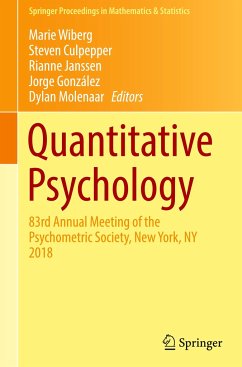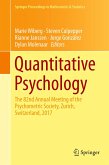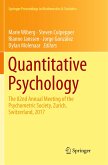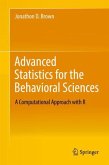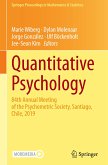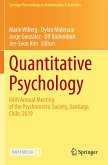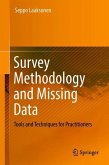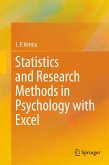Quantitative Psychology
83rd Annual Meeting of the Psychometric Society, New York, NY 2018
Herausgegeben:Wiberg, Marie; Culpepper, Steven; Janssen, Rianne; González, Jorge; Molenaar, Dylan
Quantitative Psychology
83rd Annual Meeting of the Psychometric Society, New York, NY 2018
Herausgegeben:Wiberg, Marie; Culpepper, Steven; Janssen, Rianne; González, Jorge; Molenaar, Dylan
- Gebundenes Buch
- Merkliste
- Auf die Merkliste
- Bewerten Bewerten
- Teilen
- Produkt teilen
- Produkterinnerung
- Produkterinnerung
This proceedings volume highlights the latest research and developments in psychometrics and statistics. This book compiles and expands on selected and peer reviewed presentations given at the 83rd Annual International Meeting of the Psychometric Society (IMPS), organized by Columbia University and held in New York, USA July 9th to 13th, 2018.
The IMPS is one of the largest international meetings on quantitative measurement in education, psychology and the social sciences. The last couple of years it has attracted more than 500 participants and more than 250 paper presentations from…mehr
Andere Kunden interessierten sich auch für
![Quantitative Psychology Quantitative Psychology]() Quantitative Psychology112,99 €
Quantitative Psychology112,99 €![Quantitative Psychology Quantitative Psychology]() Quantitative Psychology82,99 €
Quantitative Psychology82,99 €![Advanced Statistics for the Behavioral Sciences Advanced Statistics for the Behavioral Sciences]() Jonathon D. BrownAdvanced Statistics for the Behavioral Sciences106,99 €
Jonathon D. BrownAdvanced Statistics for the Behavioral Sciences106,99 €![Quantitative Psychology Quantitative Psychology]() Quantitative Psychology112,99 €
Quantitative Psychology112,99 €![Quantitative Psychology Quantitative Psychology]() Quantitative Psychology112,99 €
Quantitative Psychology112,99 €![Survey Methodology and Missing Data Survey Methodology and Missing Data]() Seppo LaaksonenSurvey Methodology and Missing Data104,99 €
Seppo LaaksonenSurvey Methodology and Missing Data104,99 €![Statistics and Research Methods in Psychology with Excel Statistics and Research Methods in Psychology with Excel]() J.P. VermaStatistics and Research Methods in Psychology with Excel113,99 €
J.P. VermaStatistics and Research Methods in Psychology with Excel113,99 €-
-
-
This proceedings volume highlights the latest research and developments in psychometrics and statistics. This book compiles and expands on selected and peer reviewed presentations given at the 83rd Annual International Meeting of the Psychometric Society (IMPS), organized by Columbia University and held in New York, USA July 9th to 13th, 2018.
The IMPS is one of the largest international meetings on quantitative measurement in education, psychology and the social sciences. The last couple of years it has attracted more than 500 participants and more than 250 paper presentations from researchers around the world.
Leading experts in the world and promising young researchers have written the 38 chapters. The chapters address a large variety of topics including but not limited to item response theory, multistage adaptive testing, and cognitive diagnostic models. This volume is the 7th in a series of recent volumes to cover research presented at the IMPS.
The IMPS is one of the largest international meetings on quantitative measurement in education, psychology and the social sciences. The last couple of years it has attracted more than 500 participants and more than 250 paper presentations from researchers around the world.
Leading experts in the world and promising young researchers have written the 38 chapters. The chapters address a large variety of topics including but not limited to item response theory, multistage adaptive testing, and cognitive diagnostic models. This volume is the 7th in a series of recent volumes to cover research presented at the IMPS.
Produktdetails
- Produktdetails
- Springer Proceedings in Mathematics & Statistics 265
- Verlag: Springer / Springer, Berlin
- Artikelnr. des Verlages: 978-3-030-01309-7
- 1st ed. 2019
- Seitenzahl: 472
- Erscheinungstermin: 18. Mai 2019
- Englisch
- Abmessung: 241mm x 160mm x 31mm
- Gewicht: 847g
- ISBN-13: 9783030013097
- ISBN-10: 303001309X
- Artikelnr.: 53643249
- Herstellerkennzeichnung
- Springer-Verlag GmbH
- Tiergartenstr. 17
- 69121 Heidelberg
- ProductSafety@springernature.com
- Springer Proceedings in Mathematics & Statistics 265
- Verlag: Springer / Springer, Berlin
- Artikelnr. des Verlages: 978-3-030-01309-7
- 1st ed. 2019
- Seitenzahl: 472
- Erscheinungstermin: 18. Mai 2019
- Englisch
- Abmessung: 241mm x 160mm x 31mm
- Gewicht: 847g
- ISBN-13: 9783030013097
- ISBN-10: 303001309X
- Artikelnr.: 53643249
- Herstellerkennzeichnung
- Springer-Verlag GmbH
- Tiergartenstr. 17
- 69121 Heidelberg
- ProductSafety@springernature.com
Marie Wiberg is Professor of Statistics with a specialty in psychometrics at Umeå University, Sweden. Her research interests include test equating, applied statistics, large-scale assessments and psychometrics in general. Steven Culpepper is Associate Professor at the Department of Statistics, University of Illinois at Urbana-Champaign. His research interests include Bayesian statistics, cognitive diagnosis, large-scale assessments and psychometrics in general. Rianne Janssen is Associate Professor at the Faculty of Psychology and Educational Sciences, KU Leuven in Belgium. She is chiefly interested in educational measurement and psychometrics, especially for applications in large-scale student assessments. Jorge González is Associate Professor at the Faculty of Mathematics, Pontificia Universidad Católica de Chile. His research interests include statistical modeling of social sciences data, particularly in the fieldsof educational measurement and psychometrics. Dylan Molenaar is Assistant Professor at the Department of Psychology, University of Amsterdam, the Netherlands, where he received his PhD degree in Psychology in 2012 for a thesis on "Testing distributional assumptions in psychometric measurement models with substantive applications in psychology." His research interests include item response theory, factor analysis, response time modeling, mixture modeling, modeling of intelligence test data, and modeling of genotype by means of environmental interactions.
Explanatory Item Response Theory Models: Impact on Validity and Test Development?.-A Taxonomy of Item Response Models in Psychometrika.-NUTS for Mixture IRT Models.Controlling acquiescence bias with multidimensional IRT modeling.-IRT scales for Self-reported Test-taking Motivation of Swedish students in International Surveys.-A Modification of the IRT-Based Standard Setting Method.-Model selection for monotonic polynomial item response models.-TestGardener: a program for optimal scoring and graphical analysis.-Item Selection Algorithms in Computerized Adaptive Test Comparison Using Items Modeled with Nonparametric Isotonic Model.-Utilizing Response Time in On-the-Fly Multistage Adaptive Testing.-Heuristic Assembly of a Classification Multistage Test with Testlets.-Statistical Considerations for Subscore Reporting in Multistage Testing.-Investigation of the Item Selection Methods in Variable-length CD-CAT.-A Copula Model for Residual Dependency in DINA Model.-A Cross-Disciplinary Look at Non-Cognitive Assessments .-An Attribute-Specific Item Discrimination Index in Cognitive Diagnosis.-Assessing the Dimensionality of the Latent Attribute Space in Cognitive Diagnosis through Testing for Conditional Independence.-Comparison of Three Unidimensional Approaches to Represent a Two-Dimensional Latent Ability Space.-Comparison of Hyperpriors for Modeling the Intertrait Correlation in a Multidimensional IRT Model.-On Extended Guttman Condition in High Dimensional Factor Analysis.-Equivalence Testing for Factor Invariance Assessment with Categorical Indicators.-Canonical Correlation Analysis with Missing Values: A Structural Equation Modeling approach.-Small-variance priors can prevent detecting important misspecifications in Bayesian confirmatory factor analysis.-Measuring the Heterogeneity of Treatment Effects with Multilevel Observational Data.-Specifying Multilevel Mixture Selection Models in Propensity Score Analysis.-The effect of using principal components to create plausible values.-Adopting the Multi-Process Approach to Detect Differential Item Functioning in Likert Scales.-Detection of Differential Item Functioning via the Credible Intervals and Odds Ratios Methods.-Psychometric Properties of the Highest and the Super Composite Scores.-A New Equating Method Through Latent Variables.-Comparison of two item preknowledge detection approaches using response time.-Identifying and comparing writing process patterns using keystroke logs.-Modeling Examinee Heterogeneity in Discrete Option Multiple Choice Items.-Simulation Study of Scoring Methods for Various Multiple-multiple-choice Items.-Additive Trees for Fitting Three-Way (Multiple Source) Proximity Data.-A Comparison of Ideal-point and Dominance Response Processes with a Trust in Science Thurstone Scale.-Rumor Scale Development.-An application of a topic model to two educational assessments.
Explanatory Item Response Theory Models: Impact on Validity and Test Development?.-A Taxonomy of Item Response Models in Psychometrika.-NUTS for Mixture IRT Models.Controlling acquiescence bias with multidimensional IRT modeling.-IRT scales for Self-reported Test-taking Motivation of Swedish students in International Surveys.-A Modification of the IRT-Based Standard Setting Method.-Model selection for monotonic polynomial item response models.-TestGardener: a program for optimal scoring and graphical analysis.-Item Selection Algorithms in Computerized Adaptive Test Comparison Using Items Modeled with Nonparametric Isotonic Model.-Utilizing Response Time in On-the-Fly Multistage Adaptive Testing.-Heuristic Assembly of a Classification Multistage Test with Testlets.-Statistical Considerations for Subscore Reporting in Multistage Testing.-Investigation of the Item Selection Methods in Variable-length CD-CAT.-A Copula Model for Residual Dependency in DINA Model.-A Cross-Disciplinary Look at Non-Cognitive Assessments .-An Attribute-Specific Item Discrimination Index in Cognitive Diagnosis.-Assessing the Dimensionality of the Latent Attribute Space in Cognitive Diagnosis through Testing for Conditional Independence.-Comparison of Three Unidimensional Approaches to Represent a Two-Dimensional Latent Ability Space.-Comparison of Hyperpriors for Modeling the Intertrait Correlation in a Multidimensional IRT Model.-On Extended Guttman Condition in High Dimensional Factor Analysis.-Equivalence Testing for Factor Invariance Assessment with Categorical Indicators.-Canonical Correlation Analysis with Missing Values: A Structural Equation Modeling approach.-Small-variance priors can prevent detecting important misspecifications in Bayesian confirmatory factor analysis.-Measuring the Heterogeneity of Treatment Effects with Multilevel Observational Data.-Specifying Multilevel Mixture Selection Models in Propensity Score Analysis.-The effect of using principal components to create plausible values.-Adopting the Multi-Process Approach to Detect Differential Item Functioning in Likert Scales.-Detection of Differential Item Functioning via the Credible Intervals and Odds Ratios Methods.-Psychometric Properties of the Highest and the Super Composite Scores.-A New Equating Method Through Latent Variables.-Comparison of two item preknowledge detection approaches using response time.-Identifying and comparing writing process patterns using keystroke logs.-Modeling Examinee Heterogeneity in Discrete Option Multiple Choice Items.-Simulation Study of Scoring Methods for Various Multiple-multiple-choice Items.-Additive Trees for Fitting Three-Way (Multiple Source) Proximity Data.-A Comparison of Ideal-point and Dominance Response Processes with a Trust in Science Thurstone Scale.-Rumor Scale Development.-An application of a topic model to two educational assessments.

